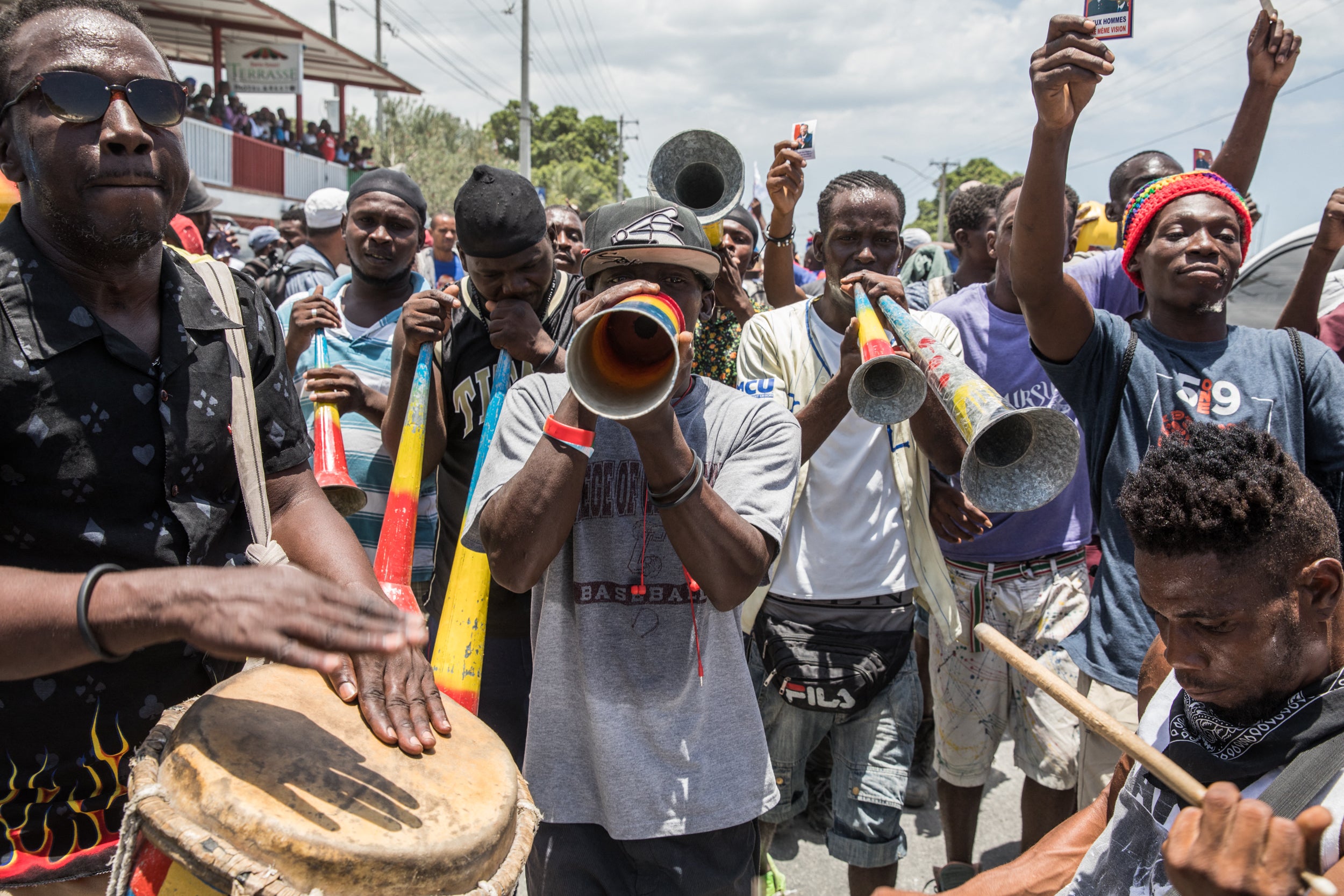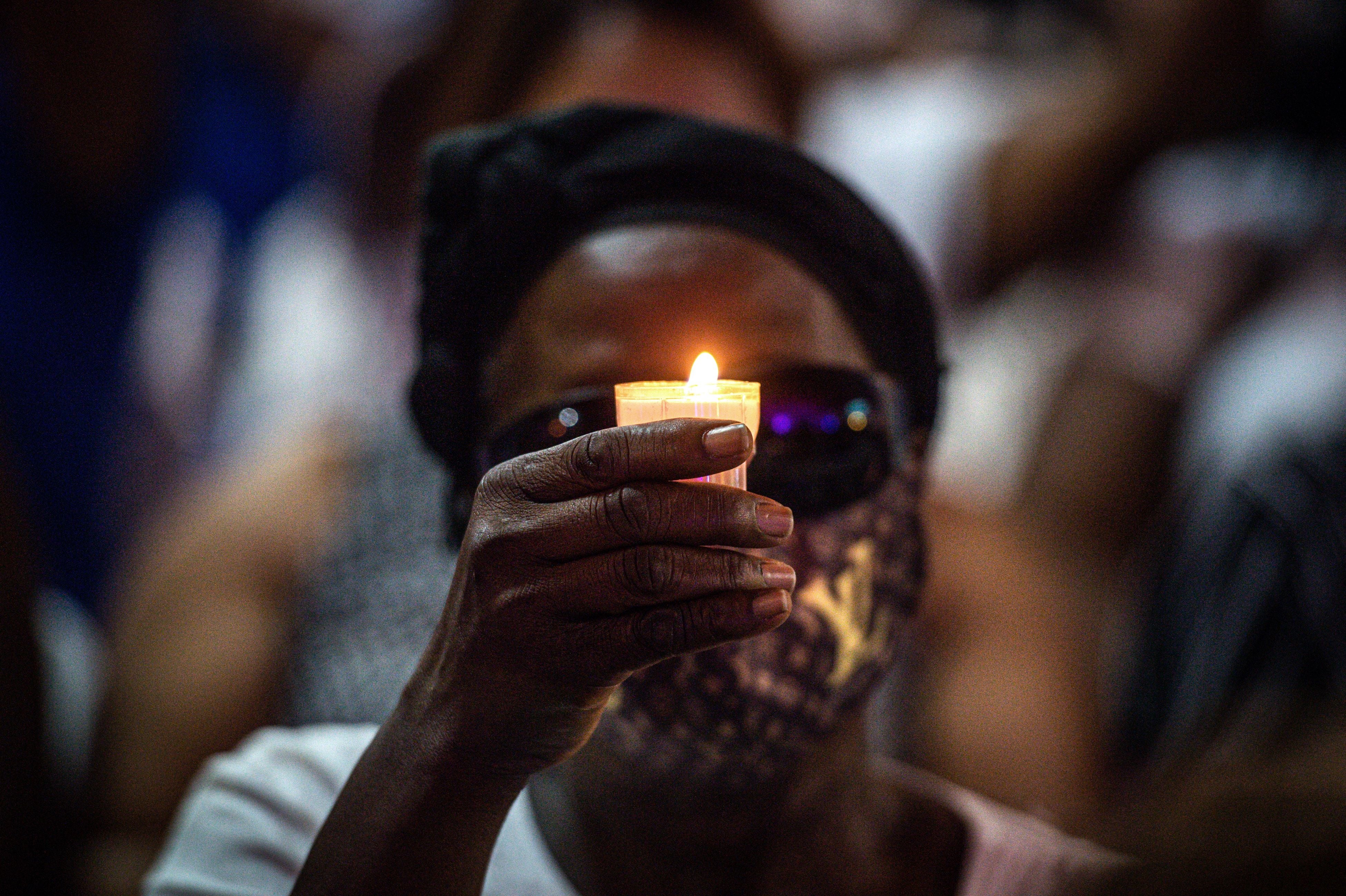Foreign powers are once again meddling in Haiti’s future – but Haitians wish they’d keep out
A new generation of activists is demanding a say in their future, writes Andrew Buncombe


Your support helps us to tell the story
From reproductive rights to climate change to Big Tech, The Independent is on the ground when the story is developing. Whether it's investigating the financials of Elon Musk's pro-Trump PAC or producing our latest documentary, 'The A Word', which shines a light on the American women fighting for reproductive rights, we know how important it is to parse out the facts from the messaging.
At such a critical moment in US history, we need reporters on the ground. Your donation allows us to keep sending journalists to speak to both sides of the story.
The Independent is trusted by Americans across the entire political spectrum. And unlike many other quality news outlets, we choose not to lock Americans out of our reporting and analysis with paywalls. We believe quality journalism should be available to everyone, paid for by those who can afford it.
Your support makes all the difference.It did not take very long.
Two days after a group of key foreign nations – their involvement arising after the assassination of the nation’s president earlier this month – announced at the weekend it supported Ariel Henry as Haiti’s next prime minister, Claude Joseph, the man currently holding the position, said he would stand aside. Neither had been elected.
“Everyone who knows me, knows that I am not interested in this battle, or in any kind of power grab,” Joseph told the Washington Post. “The president was a friend to me. I am just interested in seeing justice for him.”
From a distance, it might appear the arrangement brokered by the international community was intended to offer calm amid chaos and anxiety. The ad hoc group, consisting of Germany, Brazil, Canada, Spain, the US, France, the European Union and representatives from the United Nations and the Organisation of American States (OAS), is even know the Core Group, perhaps suggesting strength and integrity.
The international diplomats urged “the formation of a consensual and inclusive government”.
“To this end, we strongly encourage the designated Prime Minister Ariel Henry to continue the mission entrusted to him to form such a government,” it said, in what amounted to a volte face.
In the short term, at least, that appears to be what will happen.
“I present my compliments to the Haitian people who have shown political maturity in the face of what can be considered a coup,” said Henry, 71, a neurosurgeon who had been selected to be the nation’s next prime minister by Jovenel Moïse, two days before Haiti’s president was assassinated.
Moïse was killed in the first week of July, by several dozen gunmen, the bulk of them foreigners, who stormed his official residence in Port-au-Prince, murdering him and seriously injuring his wife.
A twisting investigation into the crime – the first assassination of a head of state in the Western hemisphere since John F Kennedy was killed in Dallas, Texas in 1963 – is continuing
In so many ways, the machinations that have been playing out in recent days mirror the fate suffered by Haiti for generations – or even centuries.
Formerly a French colony, Haitians fought and secured their independence in an uprising that began in 1791 and was led by self-freed slaves. Their actions reverberated across the Americas.
And yet that freedom has rarely been fully realised. Rather, Haiti for decades was ruled by harsh and brutal dictators, perhaps best exemplified by the Duvaliers, who were backed by the US and Europe as a perceived bulwark against communism.
In 1990, in what were seen as the nation’s first ever free election, Jean-Bertrand Aristide, a populist priest who wanted to help the poor, was elected president
He was ousted in a coup backed by the CIA less than a year later, and in 2004, Aristide – having won re-election in 2001 – was against forced out in a move supported by elements in Washington.
As it was, Aristide returned to Haiti last week after spending a month in Cuba for medical treatment. And this week, Martine Moïse, the 47-year-old former first lady also flew into Port-au-Prince from Miami, where she had undergone treatment following the attack on her home that killed her husband.
This weekend, the front page of the New York Times detailed how the US had backed Moïse, elected in 2016 and who sought to remain in power beyond his presumed term, even as allegations of human rights abuses mounted up.
“Critics say the American approach to Mr Moïse followed a playbook the United States has used around the world for decades, often with major consequences for democracy and human rights,” said the article.
“….reflexively siding with or tolerating leaders accused of authoritarian rule because they advance American interests.”
Yet this time something is different. The Haitian people are speaking out and demanding that they – and not the foreign powers – decide their future.
“Since 2018, Haitians are facing systematic human rights violations – corruption, assassination, gangs massacres. Today, what we need is a country where we can live, knowing that we can go out without thinking we might not be able to go back home,” said Rosy Auguste Ducena, a lawyer and activist with the human Haiti-based National Network for the Defense of Human Rights.
“We had several type of foreign intervention – military and humanitarian – and today, the international community dictates what they want to see in Haiti. But, at the end of the day, we have not seen any improvement in the situation.’
In a WhatsApp message to The Independent, she added: “Today, the civil society is asking for a chance to let Haitians find solutions to their own problems, without international interference. Our response today is stronger not because of [Moïse’s] assassination but because we can see that no result came out from the international interference.”

Many of the campaigners speaking out and organising, came of age in the 2018 protests over rising fuel prices. They have also spearheaded demands for action against corruption, triggered by accusations dating to 2019, that Moïse helped himself to hundreds of thousands of dollars of government funds due to be spent on social programmes, and involving Venezuelan PetroCaribe, oil coalition. Moise had denied the claims.
“Our demands are the same since 2019 - a government of transition to break with the bad practices of corruption, impunity, gang violence and state terrorism,” said Vélina Elysée Charlier, of the anti-corruption group Nou Pap Dòmi, or We Will Not Sleep.
“What we want is rupture from all anti-democracy behaviours in politics. We want peace through justice and we demand security. We need to break the cycle of impunity and we ask for government’s accountability.”
Jake Johnston, a Haiti researcher and writer with the Washington DC-based Centre for Economic and Policy Research, a progressive think-tank, recently returned from the country.
He said he believed one reason activists were speaking out with such a voice was the spread of social media.
The other was the increasingly poor image of international and outside groups, something that has grown since the earthquake of 2010, and the scandals that followed.
“This is the sort of grass roots organising that you saw back in 1990 with the election of Aristide.”
Monique Clesca, a Haitian writer and former UN official, said she found it astounding that foreign nations were still trying to dictate her nation’s future.
“It’s offensive that in 2021, you have a group of superpowers, along with UN, trying to decide or tell us what to do,” she said, speaking from Miami. “It’s deeply offensive and has no place.”
Clesca, whose books include a novel, La Confession, and Mosaïques, a collection of essays about women and human rights, said she was also amazed that some Haitian leaders had requested the dispatch of US troops. She said she found that close to treason.
She added: “We are not the backyard of the US or the backyard of the UN.”
Join our commenting forum
Join thought-provoking conversations, follow other Independent readers and see their replies
Comments